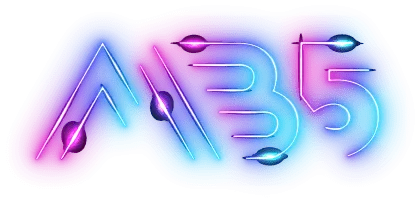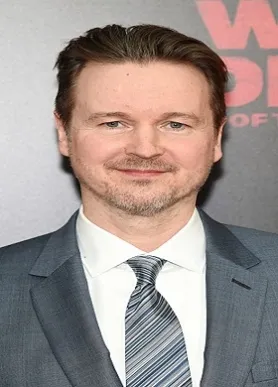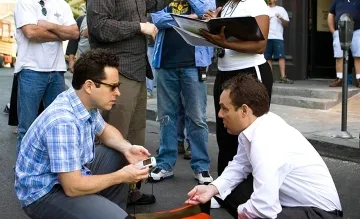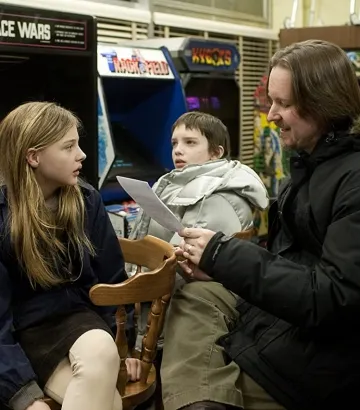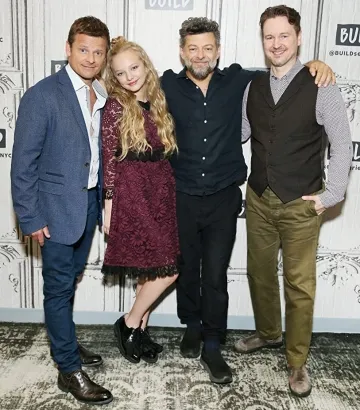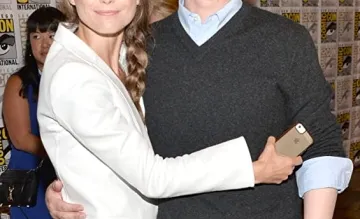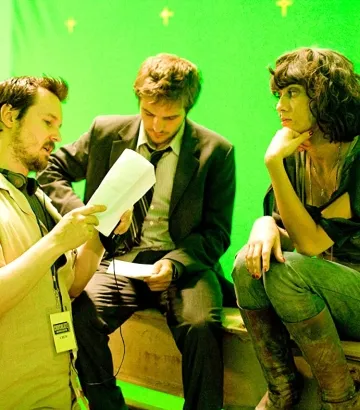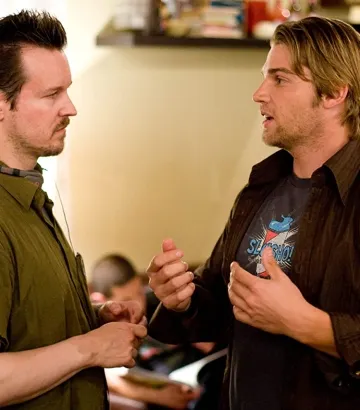Matt Reeves
Producer, Director
Date of Birth:
Apr 27, 1966
Country:
Rockville Center, New York, USA
Gender:
Male
Height:
5' 9½" (1.77 m)
Biography
Mini Bio
- Matthew George "Matt" Reeves was born April 27, 1966 in Rockville Center, New York, USA and is a writer, director and producer. Reeves began making movies at age eight, directing friends and using a wind-up camera. He befriended filmmaker J.J. Abrams when both were 13 years old and a public-access television cable channel, Z Channel, aired their short films. When Reeves and Abrams were 15 or 16 years old, Steven Spielberg hired them to transfer some of his own Super 8 films to videotape. Reeves attended the University of Southern California and there, between 1991 and 1992, he produced an award-winning student film, Mr. Petrified Forest, which helped him acquire an agent. He also co-wrote a script that eventually became Under Siege 2: Dark Territory (1995). After graduating, he co-wrote The Pallbearer (1996), which became his directorial debut.
- Reeves and J.J. Abrams co-created the TV series Felicity (1998), for which Reeves directed several episodes, including the pilot. He has also helmed occasional episodes of other television series. He co-wrote The Yards (2000) with director James Gray, which he also co-produced. In 2008, Reeves directed the monster science fiction film Cloverfield (2008), which Abrams produced. Reeves later served as an executive producer on 10 Cloverfield Lane (2016) and The Cloverfield Paradox (2018). He wrote and directed the fantasy-horror film Let Me In (2010), a remake of the Swedish film Let the Right One In (2008). Reeves directed the science fiction films Dawn of the Planet of the Apes (2014) and later the sequel, War for the Planet of the Apes (2017). He served as an executive producer on the AmTrade Mark (3)
Often works with composer Michael Giacchino.
Dark, mature themes.
Often works with cinematographer Grieg Fraser.azon original series Tales from the Loop (2020).
Trade Mark
- Often works with composer Michael Giacchino.
- Dark, mature themes.
- Often works with cinematographer Grieg Fraser.
Trivia
- He and J.J. Abrams first met screening their early shorts at an 8mm film fest in Los Angeles.
- Cites Martin Scorsese as the filmmaker who inspired him to make movies.
- Heard a lecture from Francis Ford Coppola at film school that inspired him.
- Was set to direct a film adaption of The Twilight Zone (1954-1964) but dropped out to direct Dawn of the Planet of the Apes (2014) instead.
- Unforgiven(1992) is one of his favorite movies.
- He was raised in Los Angeles, California.
- At first, he was not interested in directing Dawn of the Planet of the Apes (2014), because the outline he was presented with did not have Caesar as the main character, who Reeves believed was the true hero of the franchise. When 20th Century Fox agreed to let him change the story to his liking, he agreed to direct it.
- Was on the list of front runners to direct Man of Steel (2013).
Personal Quotes
- It's the idea that anticipation is as scary as anything in a movie could be. People's imagination is the most effective tool in creating terror or dread.
- Really interesting genre films, especially monster movies, evoke the fears of the times intentionally. Our starting point was Godzilla - the original movie was released less than 10 years after Hiroshima, and it's a classic in Japan. It came out at the same time as Seven Samurai (1954) and is held in equal regard. Yet it was definitely a metaphor for the anxiety of those times, about the fears after Hiroshima and the knowledge that we now had the ability to destroy the world. To give that the form of a giant monster - that was an effective way of exploring that fear.
- As a kid, I was always mistaken for a girl. Before you reach that age where your sexuality starts to display itself, kids can look very androgynous, and I guess I leaned more toward the feminine. All those things were very hard, growing up, because you're trying to create an identity, and you're feeling shameful about the one that you're making.
- I never would have guessed I would be making science fiction and horror films.
- I discovered the fun of genre is... you get to explore your fears, and you get to use the metaphor of the genre - whether it's a giant monster or a... 12-year-old vampire. Whatever it is, you can sink something underneath the surface and make a personal film under the guise of great fun romp.
- People's imagination is the most effective tool in creating terror or dread.
- When you think of the The Exorcist (1973) you think of Linda Blair and pea soup and all this madness, but really if you look at the first half of that film, the stuff between her and Ellen Burstyn is so naturalistic and so real.
- There's tremendous shame with being bullied. I think there's a level at which you think that there's a reason that you're being singled out, that you're being chosen.
- There's something about seeing a movie that you like, and being able to see the scenes that didn't make it, just as a window into the process of how choices are made and how a movie is made. To me, the idea of getting to have the scenes on the DVD is very exciting.
- It's funny, people don't think of Cloverfield (2008) as being restrained because it's a handycam movie, but the only reason it's a handycam movie is because that was supposed to be the reality of the situation.
- When we were all kids, there was one particular trailer that I think we can all remember. That was the trailer for Close Encounters of the Third Kind (1977) There was an amazing teaser trailer with all this weird kind of documentary footage. We were like, 'What was that! I've got to see that! What the hell was that?'
- In a weird way, if you look at all the 'Apes' movies, they all seem like different stories in the same universe. Beneath the Planet of the Apes (1970) is definitely a continuation, but the other ones jump all around chronologically.
- I was obsessed with movies, and it ended up being the tool with which I could make friends. Because I was too painfully shy in other circumstances, I would say, 'Hey, do you want to make a movie?' And that's how I made friends, and it was also my escape.
- I'm a first-time father, and it was amazing to me to learn that my son could actually use sign language before the spoken word. I could see this intelligence in his eyes before he could speak: how he could understand what was going on around him and was frustrated by that.
- It's crazy when you think about the 'Apes' franchise and how dark all of the endings are and how dark the movies are, and yet there's something very pleasurable about these movies. It really comes down to the potency of this idea, of seeing intelligent apes.
- I'm always looking for a reason to say no when I'm approached about a big studio tentpole because your fear is will you be consumed into the anonymous machine, and it will suck out any specificity and point of view that you might hope to express.
- I remember watching the Blu-ray, and also when they first released it on DVD in the collection of all three movies of The Godfather (1972) and seeing all of those scenes that they cut out, and there wasn't a single one of them that I wished they had kept it, but they were the most exciting thing to watch anyway.
- I thought this was the most incredible opportunity. Because 'Planet Of The Apes,' aside from the fantasy element of talking apes, is such an amazing franchise, because under the surface of that genre, you're actually looking at human nature.
- Avatar (2009) was incredible and totally groundbreaking, but it wasn't about utter realism. It had a great mythic fantasy to it, but the characters don't seem totally photo-real, as amazing as they are.
- I wanted to explore the possibility that this could have become 'Planet of the Humans and the Apes' instead of just 'Planet of the Apes,' so I wanted there to be this hope of connection as well as this inexorable pull towards what we know the series becomes.
- Really interesting genre films, especially monster movies, evoke the fears of the times intentionally.
- [on taking over as director of The Batman (2022) ] I have loved the Batman story since I was a child. He is such an iconic and compelling character, and one that resonates with me deeply. I am incredibly honored and excited to be working with Warner Bros. to bring an epic and emotional new take on the Caped Crusader to the big screen
- With all my movies, what I try to do in an almost Hitchcockian sense is use the camera, and use the storytelling, so that you become the character, and you emphasize with that point-of-view.
- The filmmaker who made me want to make movies was Martin Scorsese when I was young, and through him, I discovered Alfred Hitchcock, and I realized: Ah! The power of cinema is this idea of putting in this empathetic relationship with someone who isn't you, even someone who's doing things you'd like to think you'd never do, so that you can question those things about yourself.
Gallery
Photo Gallery
